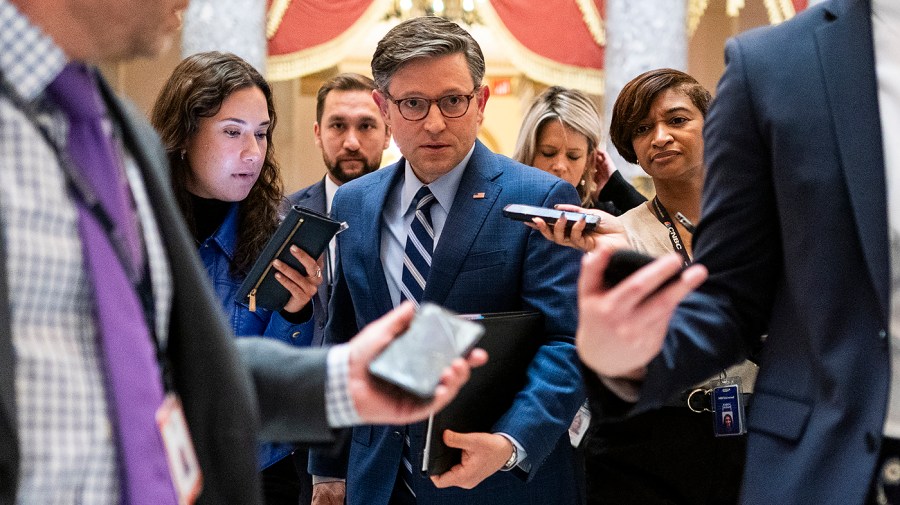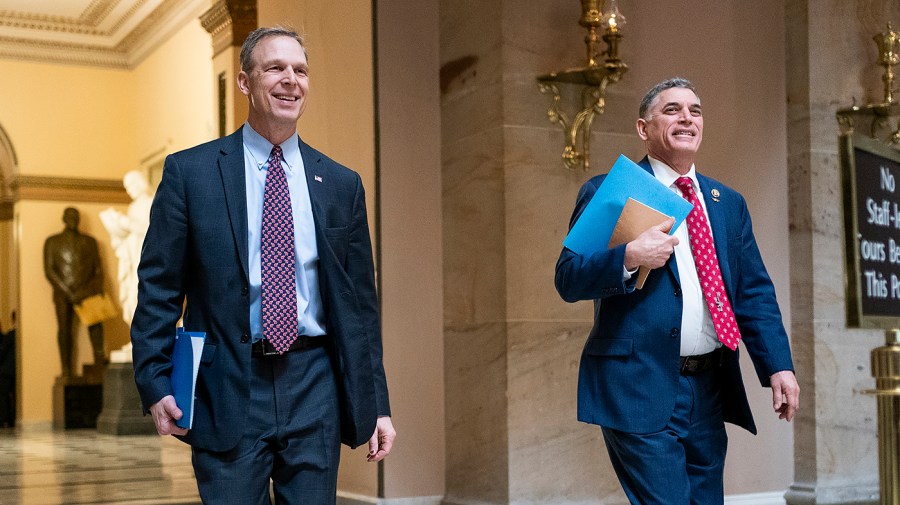House conservatives huddle with Speaker Johnson on alternate spending deal
Hard-line conservative House members who were furious about a top-line spending deal struck by congressional leaders left a meeting with Speaker Mike Johnson (R-La.) on Thursday saying they are working on an alternative plan.
“It’s not going to be the current deal,” said Rep. Ralph Norman (R-S.C.), adding he believed there would be some kind of stopgap funding measure to avert a government shutdown.
But Johnson has not committed to pursuing any new spending levels.
“We’re having thoughtful conversations about funding options and priorities. We had a cross section of members in today. We’ll continue having cross sections and members in and while those conversations are going on, I made no commitments,” Johnson said.
Backing out of the deal, if the Speaker goes that way, would throw massive uncertainty into how Congress will avoid a government shutdown ahead of Jan. 19 and Feb. 2 funding deadlines — and through the rest of the fiscal year that ends on Sept. 30.

Speaker Mike Johnson (R-La.) addresses reporters as he returns to his office from a series of procedural votes and meetings to discuss funding the government on Thursday, January 11, 2024. (Greg Nash)
Members of the House Freedom Caucus and their ideological allies huddled in Johnson’s office a day after a group of conservatives tanked a procedural vote in a revolt against the spending deal that Johnson and Democratic leaders announced Sunday — preventing the chamber from moving forward on three unrelated measures.
“There’s going to be a new deal drawn up and that’s what we’re in the process of doing,” Rep. Marjorie Taylor Greene (R-Ga.) said after leaving the meeting.
But Rep. Scott Perry (R-Pa.), a former chair of the Freedom Caucus, said Johnson has not committed to anything yet.
“We’re still working,” Perry said.

Reps. Scott Perry (R-Pa.) and Andrew Clyde (R-Ga.) are seen in Statuary Hall during a series of procedural votes on Thursday, January 11, 2024. (Greg Nash)
The agreement announced over the weekend — which is largely in line with the caps set in the debt limit deal then-Speaker Kevin McCarthy (R-Calif.) struck with President Biden last year — includes a $1.59 trillion top line, plus roughly $69 billion in budget tweaks to increase nondefense dollars for most of fiscal 2024. It also includes an additional $10 billion in cuts to IRS mandatory funding and a $6.1 billion clawback of unspent COVID-19 funds.
Johnson has said this week the deal is the best the conservatives could get under the circumstances of a razor-thin House majority, a Democratic Senate, and a Democratic White House.
News of the discussions surprised some Senate Republicans, with Senate Minority Whip John Thune (R-S.D.) saying he did not know the talks were happening.
Sen. Shelly Moore Capito (R-W.Va.), wide-eyed when asked about a potential alternative being crafted in the House, said, “That’s interesting.”
House Minority Leader Hakeem Jeffries (D-N.Y.) warned Republicans against reneging on the deal.
“There is nothing more to discuss,” Jeffries said. “To the extent that House Republicans back away from an agreement that was just announced a few days ago, it will make clear that House Republicans are determined to shut down the government, crash the economy and hurt the American people.”
More Top Stories from The Hill
- Trump loses ground, Haley sees 10-point boost in New Hampshire poll
- Hunter Biden’s daughter hits back at Greene for ‘lying’ at House hearing
- Senate GOP caught off guard by talks of alternative spending deal: ‘Good luck’
- Johnson risks same fate as McCarthy with spending deal
Senate Majority Leader Chuck Schumer (D-N.Y.), who is setting up a short-term stopgap to avert a partial government shutdown in just more than a week, is pressing forward on the current agreement.
“Look, we have a top-line agreement. Everybody knows to get anything done, it has to be bipartisan. So we’re going to continue to work to pass a [continuing resolution] and avoid a shutdown,” Schumer told reporters.
The form of any kind of continuing resolution (CR) to fund the government is another subject of debate among House Republicans.
Rep. Jim Jordan (R-Ohio), chair of the House Judiciary Committee, is among those advocating for a long-term stopgap that would trigger an automatic, across-the-board 1 percent cut that was written into the Fiscal Responsibility Act (FRA) debt limit bill last year.
“Do the long-term CR and negotiate on the policy we want to get the border,” Jordan said coming out of the meeting in Johnson’s office. “That creates the incentive to actually do the work we’re supposed to do.”
Rep. Matt Gaetz (R-Fla.) said that much of the discussion in the meeting with Johnson was about what kind of stopgap House Republicans should support.
“There was a mutual understanding that a CR of some kind is coming,” Gaetz said. “There are some who believed that should be a short-term CR. There are some who believe that should be a long-term CR. There are some who believe that it should be less CR-flavored and more border fight-flavored.”
Mike Lillis, Al Weaver, and Aris Folley contributed.
Updated at 1:57 p.m.
Copyright 2024 Nexstar Media Inc. All rights reserved. This material may not be published, broadcast, rewritten, or redistributed..











